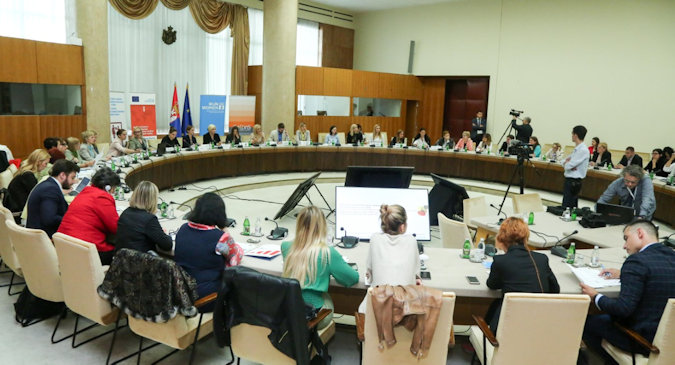State institutions and civil society join forces to implement CEDAW recommendations in Serbia
Representatives of Serbian civil society organizations and state institutions have pledged to jointly ensure the effective implementation of the CEDAW Committee's recommendations and have already established a monitoring system to measure the progress on the way.Date:

Following the Concluding Observations on the fourth periodic report of Serbia on the Convention on the Elimination of all Forms of Discrimination against Women (CEDAW), UN Women’s partner SOS Network of Vojvodina organized a high-level conference within the framework of the EU-UN Women regional programme "Ending violence against women in the Western Balkans and Turkey: Implementing Norms, Changing Minds," funded by the European Union.
The conference, which gathered representatives of both the relevant state bodies and civil society organizations, aimed to ensure the implementation of the CEDAW Committee’s recommendations, in which the Committee welcomes the progress made, especially the legal reforms undertaken and the ratification of the Council of Europe Convention on preventing and combating violence against women and domestic violence (known as the Istanbul Convention), but also urges Serbia to advance gender equality and reduce gender-based violence.
According to Biljana Stepanov, director of SOS Network of Vojvodina, these recommendations can help the state focus on and prioritize specific areas for improvement.
"This was a unique opportunity for civil society and partner organizations to have their say in front of state representatives on what we see is important for the state to focus on in order to improve the field of women's human rights in the country," Stepanov added.
Among other things, the Committee urged the state to take all necessary measures to combat the anti-gender discourse and to intensify efforts to raise women’s awareness about their rights under the Convention. According to the Committee, the state is required to enable access to free legal aid for victims of all forms of gender-based discrimination and to strengthen cross-sectoral cooperation in order to prevent and combat gender-based violence.
Suzana Paunovic, director of the Office for Human and Minority Rights in Serbia, stressed the importance of joint work of both the state and civil sector on the issue. “Once this four-year reporting period is completed, we should again sit together to assess what we have done and identify issues in certain areas and what causes them, so we know what to do next and how to tackle them,” Paunovic noted.
According to Jelena Milovanovic, technical project analyst with UN Women in Serbia, the conference also served as an introduction to the process of monitoring the implementation of each of the CEDAW recommendations to Serbia.
“The monitoring framework has been prepared in the consultative process led by SOS Network of Vojvodina during July and August. The indicators developed by civil society organizations should be compared with the ones developed by the state in order to extract the core values for monitoring by both parties to assess progress during the next four years,” Milovanovic concluded.